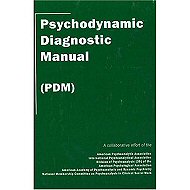|
Psychodynamic Diagnostic Manual (PDM)
|
American Psychoanalytic Association
Alliance of Psychoanalytic Organizations
|

|

From the Introduction
The Psychodynamic Diagnostic Manual (PDM) is a diagnostic framework that attempts to characterize an individual's full range of functioning - the depth as well as the surface of emotional, cognitive, and social patterns. It emphasizes individual variations as well as commonalities. We hope that this framework brings about improvements in the diagnosis and treatment of mental disorders and permits a fuller understanding of the functioning of the mind and brain and their development. The goal of the PDM is to complement the DSM and ICD efforts of the past 30 years in cataloguing symptoms by explicating the broad range of mental functioning.
The PDM is based on current neuroscience, treatment outcome research, and other empirical investigations. Research on brain development and the maturation of mental processes suggests that patterns of emotional, social, and behavioral functioning involve many areas working together rather than in isolation […]
The PDM was created through a collaborative effort of the major organizations representing psychoanalytically oriented mental health professionals […]
The diagnostic framework formulated by the PDM work groups systematically describes:
* Healthy and disordered personality functioning;
* Individual profiles of mental functioning, including patterns of relating,
comprehending and expressing feelings, coping with stress and anxiety,
observing one's own emotions and behaviors, and forming moral
judgments; and
* Symptom patterns, including differences in each individual's personal,
subjective experience of symptoms.
The PDM adds a needed perspective to existing diagnostic systems. In addition to considering symptom patterns described in existing taxonomies, it enables clinicians to describe and categorize personality patterns, related social and emotional capacities, unique mental profiles and personal experiences of symptoms. It provides a framework for improving comprehensive treatment approaches and understanding both the biological and psychological origins of mental health and illness. […]
|
|
